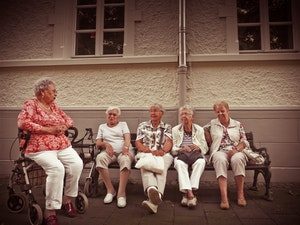
Approximately seven million individuals over the age of 65 experience symptoms of depression, recent studies revealed that social activity for seniors can reduce depression and dementia. Photo from Micheal Gaida via pixabay.com
Maintaining healthy relationships is crucial for individuals at every age, but especially for seniors. Isolation can be an extremely common problem among seniors who are living alone. While seniors may enjoy their independence living in their own home, they can still experience loneliness. Many seniors have spent a considerable portion of their lives in the company of others – be it in the workplace or raising children. Upon reaching retirement age, and with children leaving the house, the opportunities for remaining socially active often decrease, especially if the senior has to rely on others for transportation. It is important for seniors to stay engaged and connected, which is why moving to a senior living community can be extremely beneficial.
Benefits of social activity for seniors
The relationship between physical activity and vitality is well-documented, but multiple recent studies have revealed an increasingly stronger link between social interaction and a senior’s mental and physical well-being. Research has indicated that an active social lifestyle is more important than ever in helping seniors maintain a sharp mind, remain connected to the world around them, increase their own feelings of happiness, and to develop a sense of belonging. Various studies have shown that social activity for seniors has the following effects:
Improved mental health
Symptoms of depression and memory problems affect many seniors. Approximately seven million individuals over the age of 65 experience symptoms of depression, and it is estimated that dementia touches 1 in 7 Americans over the age of 71. Recent studies revealed that consistent human contact and interaction can reduce depression and dementia.
Improved nutrition
The need for proper nutrition is crucial for seniors, but healthy habits can be difficult to maintain when living alone. Many elderly people suffer from malnutrition. Studies show that seniors who have more social interactions were not only more friendly and lively, but that they also had more food intake.
Finding ways for seniors to stay socially active
Many seniors have family members or other caregivers who occasionally interact with them, but that is not always enough to keep them happy and engaged. While it is comforting for seniors to know their needs are met, they should also be consistently engaging with others, primarily with peers.
There a variety of different social activities for seniors to help them stay engaged. These include:
- Volunteering
- Joining clubs and groups
- Moving to retirement communities
- Staying connected with friends and family
- Getting a pet
- Attending a church
- Learning new skills
- Learning to use the internet
When it comes to socializing, the more the merrier! Seniors in large groups are more likely to encourage healthy habits among each other, including exercise.
Staying actively engaged while aging
Seniors may resist change and may need additional gentle encouragement to get more socially involved, but the benefits of an active social lifestyle reach well into the future.
Search Retirement Connection Listings for Southern Oregon
Search Retirement Connection listings for Medford Social Groups
